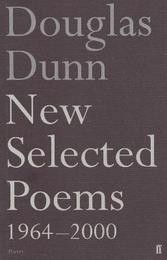
|
New Selected Poems: Douglas Dunn
Paperback / softback
Main Details
| Title |
New Selected Poems: Douglas Dunn
|
| Authors and Contributors |
By (author) Douglas Dunn
|
| Physical Properties |
| Format:Paperback / softback | | Pages:352 | | Dimensions(mm): Height 215,Width 140 |
|
| Category/Genre | Poetry by individual poets |
|---|
| ISBN/Barcode |
9780571215270
|
| Classifications | Dewey:821.914 |
|---|
| Audience | | General | | Undergraduate | | Postgraduate, Research & Scholarly | | Professional & Vocational | |
|---|
| Edition |
Main
|
|
Publishing Details |
| Publisher |
Faber & Faber
|
| Imprint |
Faber & Faber
|
| Publication Date |
20 January 2003 |
| Publication Country |
United Kingdom
|
Description
In a distinguished poetic career, Douglas Dunn has won the Somerset Maugham Award, the Geoffrey Faber Memorial Prize, the Hawthornden Prize and the Whitbread Book of the Year. New Selected Poems 1964-1999 offers a substantial selection drawing on the entire range of Dunn's poetry, from Terry Street (1969) to The Year's Afternoon (2000).
Author Biography
Douglas Dunn was born in Inchinnan, Renfrewshire, in 1942 and lived there until he married at the age of twenty-two. After working as a librarian in Scotland and Akron, Ohio, he studied English at Hull University, graduating in 1969. He then worked for eighteen months in the university library after which, in 1971, he became a freelance writer. In 1991 he was appointed Professor in the School of English at the University of St Andrews.As well as ten collections of poetry, including Elegies (1985), The Year's Afternoon and The Donkey's Ears (both 2000), Douglas Dunn has written several radio and television plays, including 'Ploughman's Share' and 'Scotsman by Moonlight'. He has also edited The Faber Book of Twentieth-Century Scottish Poetry (2000).Douglas Dunn has won a Somerset Maugham Award, the Geoffrey Faber Memorial Prize, and has twice been awarded prizes by the Scottish Arts Council. In 1981 he was awarded the Hawthornden Pr
Reviews'Elegies is probably the finest long poem of its kind since Tennyson's In Memoriam.' Jonathan Raban 'An enviable range of moods and measures, by turns wildly inventive, poignantly naked, dour, dramatic and funny.' Anthony Thwaite, Sunday Telegraph
|